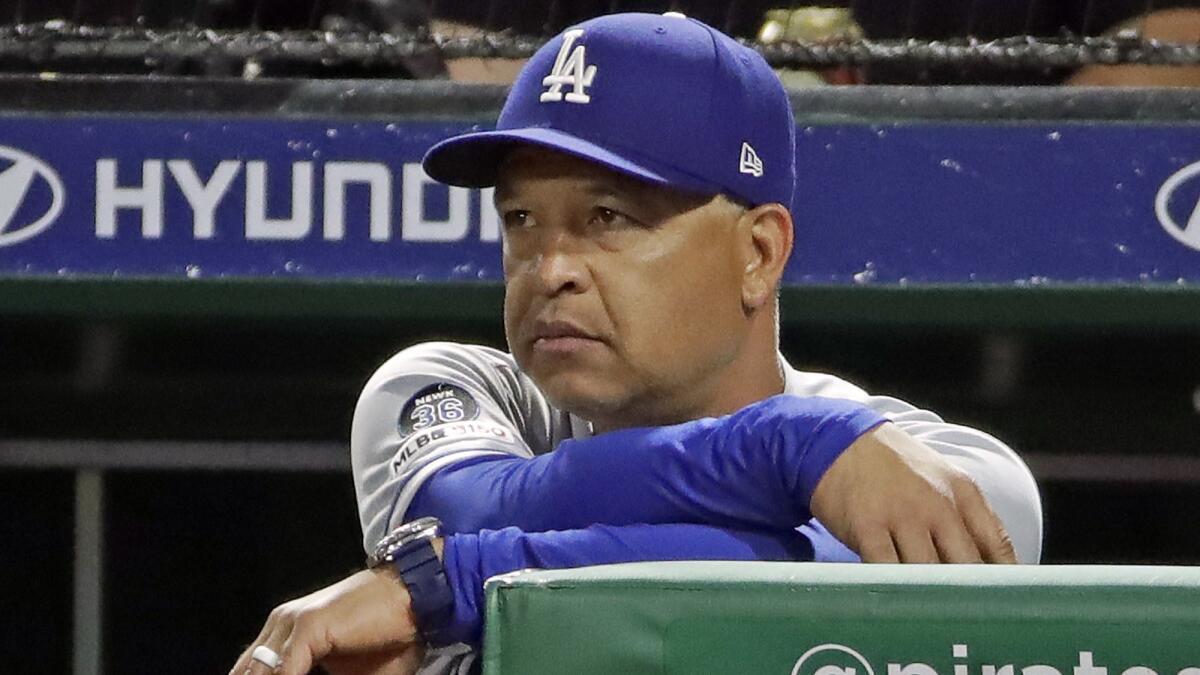Dodgers manager Dave Roberts would like a White House invitation to decline

Dave Roberts learned he had drawn the ire of the president of the United States in the most public of settings, sitting at a postgame news conference, broadcast to millions, as he sifted through the wreckage of Game 4 of the 2018 World Series.
The loss effectively ended the Dodgers’ season. Responsibility for the defeat rested on Roberts’ shoulders. The manager had already weathered jeers from the home crowd at Dodger Stadium when he heard President Trump had tweeted that Roberts made a “big mistake!”
Roberts crossed his arms and leaned forward as a reporter read him Trump’s tweet. A smirk creased his face, and then a scowl. “The president said that?” Roberts said. He inhaled and collected himself. “That’s one man’s opinion,” he said.
Then Roberts moved on. There was no drawn-out controversy, no volleys lobbed toward Trump. Roberts absorbed the criticism and effectively shrugged.
“There’s no benefit to responding to an irresponsible tweet irresponsibly, or ignorantly,” Roberts said over breakfast one morning last week. “So, I guess it’s one of those ‘consider the source’-type things. Which is sad, because that’s the leader of our country. That I have to say, ‘Consider the source.’ It’s sad.”
The paths of a baseball manager and the leader of the free world rarely cross. Unless, of course, the baseball manager’s team wins the World Series. Roberts intends for the Dodgers to achieve that goal this autumn. He indicated it was unlikely he would visit the White House afterward.
“We have to win it first,” Roberts said. “But one trip to D.C., playing the Nationals, is plenty for me.”
The blend of confidence and candor befits his status as he prepares to manage the National League at the All-Star Game in Cleveland on Tuesday night. Roberts has never felt more secure as manager of the Dodgers. Any howls for his dismissal have quieted. He hammered out a four-year contract extension over the winter. He presides over the presumptive favorite to win the National League pennant, a colossus on pace for 106 wins, a group he believes is the best he has managed in his four years at the helm.
The talent at Roberts’ disposal make him the envy of other managers. His lineup flaunts 23-year-old star Cody Bellinger, the first-half front-runner for National League MVP. His pitching rotation includes Clayton Kershaw, Walker Buehler and Hyun-Jin Ryu; all three made the All-Star team, and Ryu will start the game. His front office has pledged to be proactive about improving the team’s less reliable bullpen.
Roberts benefits from this largess. His affection for the group extends beyond the talent. He described them as “a very blue-collar team,” a collection of players uninterested in the histrionics of last season, when the team needed an extra tie-breaking game against the Colorado Rockies to win the National League West. He suggested they had grown steely and resolute in the wake of losing the World Series the last two seasons.
“We feel it every day, but it’s something that’s not talked about,” Roberts said. “It’s like the best of all worlds. Because it’s forefront of mind, but it’s not talked about. But the work reflects it.”
The team does not rattle. On Friday evening, as an earthquake rocked Dodger Stadium, Roberts pondered his safety in the dugout. Then he looked out at the diamond. Utility infielder Enrique Hernandez ignored the rumbling and stepped back into the batter’s box.
Roberts could laugh about the moment during a phone conversation with Houston Astros manager A.J. Hinch after the game. Roberts considers Hinch one of his closest friends in baseball. Hinch can relate to Roberts’ burden. Hinch must juggle the egos and attitudes of his own club, which defeated the Dodgers in the 2017 World Series, while interpreting the innovations requested by his front office. The balancing act demands equilibrium.
“With so many things pulling at players, or people advising players, they look for a steady mindset as a leader,” Hinch said. “And he has it.” Added Hinch: “They need to know what the expectations are. And I think Dave’s one of the best at setting the bar, and being consistent.”
Sign up for our daily sports newsletter »
Roberts preaches to his players the importance of being steadfast inside the maelstrom of the season. This team has incorporated his message. Andrew Friedman, the Dodgers’ president of baseball operations, praised Roberts for fostering that environment.
“To me, he’s been remarkably consistent,” Friedman said. “It’s been the same thing, year after year. He does an incredible job of putting guys in the best positions to succeed. The culture that he’s helped cultivate in the clubhouse, his communication skills, are something that he has been incredibly consistent with.”
The job requires Roberts to operate as the face of his organization. He must explain himself when decisions backfire. He addresses the media twice a day, daily, throughout the summer. He has armored himself to ignore whatever critiques he receives for his maneuvers, like removing pitcher Yu Darvish too late in the 2017 World Series, or replacing Rich Hill too soon in the 2018 World Series.
“You look back at what we’ve done,” Roberts said. “I think we’ve done a lot of great things. But people get hung up on certain things. For me, it’s easy to continue to move forward, and not take it personal. It’s unfortunate if people can’t enjoy what the players, the organization, what we’re doing, in the moment.”
On Tuesday, the Dodgers trailed the Arizona Diamondbacks by a run in the ninth inning. The offense had been quiet all evening. On the mound stood Diamondbacks three-time All-Star closer Greg Holland. He recorded two quick outs and was a strike away from securing a win.
And then a remarkable thing happened. Chris Taylor battled back from a no-balls, two-strike count and worked a walk. Russell Martin followed with a walk. Then came a third walk, and a fourth. When Bellinger took the fifth walk in a row, the Dodgers had collected a victory without swinging the bat.
“We put on a clinic there in the ninth inning,” Roberts said.
“We just have the mentality of winning one pitch at a time,” Martin said.
“Everyone is feeding off each other,” Bellinger said.
The next morning, Roberts bounded into a bakery in Toluca Lake. He is a regular. The server beamed as Roberts sat down.
“¿Qué pasó, señor?”
“How you doing, amigo?” Roberts said.
“Hot coffee?”
“Please.”
Roberts perused the menu and ordered a bowl of oatmeal, berries and chia seeds. He chuckled when it was suggested that his order fit in with the diets of his millennial players, many of whom have stopped eating dairy. “I eat cheese,” Roberts insisted. “I love cheese. If you like wine, you like cheese.”
As his breakfast arrived, he considered the passage of time. The All-Star Game will be played in Cleveland; 20 years ago, Roberts made his big-league debut for the Indians. As a 28th-round draft pick, he was not expected to stay in pro ball for long.
Instead, Roberts forged a 10-year career in the majors. He won a World Series with the 2004 Boston Red Sox and secured a place in baseball history with his game-turning stolen base in the American League Championship Series. He became the first minority manager in Dodgers’ history, and then led the team to its first pennant since 1988.
“It’s been a good 20 years, man,” he said. “It’s been a good run.”
The only blank on his resume involves winning the title that has eluded Los Angeles for 31 seasons.
Will this October be different? Roberts believes so. He might not want to visit the White House. But he would like the chance to turn down the invitation.
“This team is not going to stop until we hoist that trophy up,” Roberts said. “It’s very apparent.”
Twitter: @McCulloughTimes
More to Read
Go beyond the scoreboard
Get the latest on L.A.'s teams in the daily Sports Report newsletter.
You may occasionally receive promotional content from the Los Angeles Times.











